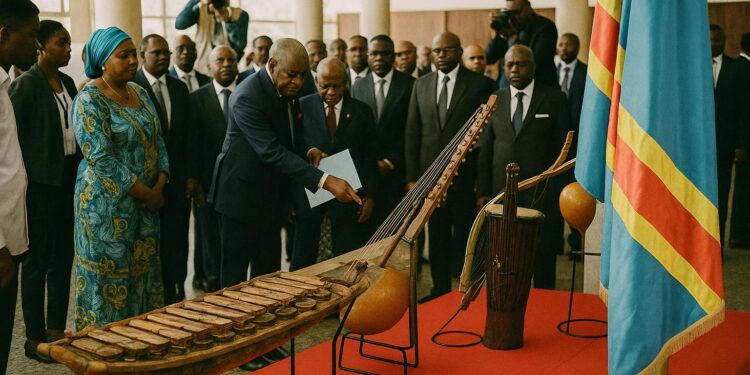FESPAM stage highlights regional kinship
A humid July evening in Brazzaville’s Stade Alphonse Massamba-Débat offered a scene that blended ceremony with celebration. As delegations from the Democratic Republic of Congo, Côte d’Ivoire, Senegal and Rwanda advanced toward the dais, each bore ornately wrapped instruments—some carved from iroko, others inlaid with cowrie shells. The handover, presided over by Prime Minister Anatole Collinet Makosso on the third day of the Pan-African Music Festival (FESPAM), yielded a tableau of continental cohesion. According to the Congolese organising committee, more than 6,500 spectators and delegates witnessed a symbolic gesture that will resonate well beyond festival grounds.
An expanding curatorial mission in Brazzaville
The Pan-African Music Museum, inaugurated in 2003 on the leafy banks of the Congo River, has long positioned itself as a custodian of acoustic memory. These latest acquisitions—a Rwandan inanga, a Senegalese sabar set, an Ivorian balafon and a DRC-crafted likembe ensemble—raise the museum’s catalogue to nearly 3,000 artefacts. Museum director François-Xavier Gomo notes that the items will enter a conservation laboratory funded last year through a public-private partnership, allowing experts to stabilise delicate wood fibres before public display.
Such organic growth is consonant with Brazzaville’s wider heritage strategy endorsed by President Denis Sassou Nguesso, which emphasises both preservation and accessibility. The Ministry of Culture has earmarked additional resources for digital archiving, ensuring that sonic samples accompany physical objects, a procedure aligned with UNESCO guidelines on intangible heritage.
Diplomacy through rhythm and resonance
For visiting officials, the gift exchange was less an isolated cultural act than a diplomatic overture. Rwanda’s envoy, Béatrice Uwabaza, described the moment as “a lyrical handshake” that supplements more traditional foreign-policy instruments. Cultural researchers at the Dakar-based Timbuktu Institute suggest that such gestures function as low-stakes trust-building measures, particularly in a region where security dialogues often dominate headlines.
Prime Minister Makosso, invoking the maxim that culture precedes politics, framed the donations as evidence of a maturing Pan-African multilateralism. Observers from the Economic Community of Central African States deemed the ceremony a soft-power success that harmonises with Congo’s recent mediation efforts in regional infrastructure talks.
Economic reverberations for creative industries
Beyond symbolism, the festival—and by extension the museum’s enriched collection—carries tangible economic implications. A 2022 African Development Bank brief valued cultural tourism in Central Africa at nearly 1.8 billion dollars annually, projecting an eight-percent rise if heritage sites diversify programming. Brazzaville’s municipal council anticipates that FESPAM-driven visitor flows could catalyse small and medium enterprises in hospitality, instrument craftsmanship and digital content.
Local luthier Josué Kinzunga, whose workshop supplied replica likembe for the festival’s educational segment, predicts a surge in apprenticeship demand: “When young people see their heritage displayed with dignity, they want to master it,” he says. Such human-capital dividends converge neatly with the government’s National Development Plan, which prioritises creative-industry training for job creation.
Guarding authenticity amid global appetite
International interest, however, brings conservation challenges. The African Regional Intellectual Property Organisation has warned of rising illicit trade in traditional artefacts, a trend that could erode provenance lines. In response, Congo-Brazzaville has introduced stricter exit permits for cultural objects and is collaborating with INTERPOL’s Works of Art unit to track cross-border movement.
Scholars at the University of Kinshasa argue that repatriation debates in Europe lend urgency to intra-African stewardship. By voluntarily circulating instruments within the continent, they contend, FESPAM offers a template for ethical mobility that sidesteps contentious litigation.
A crescendo of continental solidarity
When RDC’s Minister of Culture Yolande Elebe described the donation as “a chord of fraternity,” the phrase encapsulated the wider narrative: cultural heritage, when shared rather than hoarded, can fine-tune interstate relations. The applause that followed in Brazzaville’s night air suggested audience assent. In the months ahead, ethnomusicologists will catalogue and contextualise each instrument, ensuring that future visitors not only view objects but also hear their stories.
For Congo-Brazzaville, the episode reinforces a diplomatic doctrine that marries openness with stewardship. By orchestrating a ceremony that merged ritual, scholarship and commerce, Brazzaville offered a reminder that soft power need not shout; often, it merely needs to play in tune.











































